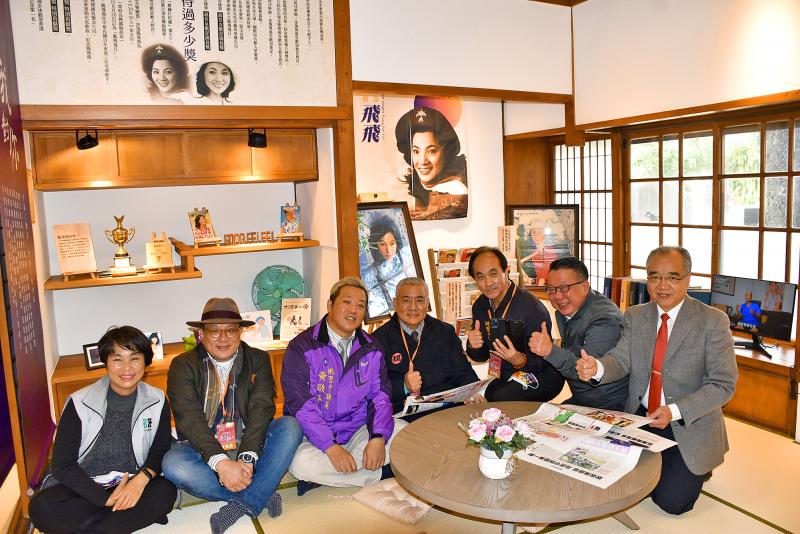The son of pop singer Fong Fei-fei (鳳飛飛) on Monday warned against unauthorized use of his mother’s name, a move that comes one day after a museum dedicated to Fong, who died in 2012, opened in Taoyuan.
Chao Wen-lin, who heads a charity foundation dedicated to his mother, wrote on Facebook that Fong stated in her will that no memorial dedicated to her should be built after her death.
“Certain people repeatedly touted their love for Fong Fei-fei and did things in her name that were disrespectful of my mother’s will,” he wrote, adding that “neither the foundation nor I have consented to their actions, which constitute an infringement on our rights.”

Photo: Lee Jung-ping, Taipei Times
Chao and the Fong Fei-fei Charity Foundation might seek legal action for unlicensed use of her name, he said.
The comments come after the grand opening of the Fong Fei-fei Story House in the singer’s native Dasi District (大溪).
The event, held by the Tokoham Culture and Education Foundation, was attended by Taoyuan Deputy Mayor Kao An-pang (高安邦) and Fong’s brother, Lin Yu-nung (林語農).
Chuang Hsiu-mei (莊秀美), director-general of the Taoyuan City Department of Cultural Affairs, which sponsored the museum, said that department officials are trying to “open lines of communication” to reach an understanding with Chao.
Fong’s legacy is an intangible cultural heritage for Taoyuan, she said, adding that fans of Fong have donated their personal collections of memorabilia to the museum.
The department funded the museum to keep Fong’s spirit alive, offer educational activities and honor a daughter of the district, she said.
The city government hopes that Chao would appreciate the department’s good intentions, Chuang said.

The manufacture of the remaining 28 M1A2T Abrams tanks Taiwan purchased from the US has recently been completed, and they are expected to be delivered within the next one to two months, a source said yesterday. The Ministry of National Defense is arranging cargo ships to transport the tanks to Taiwan as soon as possible, said the source, who is familiar with the matter. The estimated arrival time ranges from late this month to early next month, the source said. The 28 Abrams tanks make up the third and final batch of a total of 108 tanks, valued at about NT$40.5 billion

Two Taiwanese prosecutors were questioned by Chinese security personnel at their hotel during a trip to China’s Henan Province this month, the Mainland Affairs Council (MAC) said yesterday. The officers had personal information on the prosecutors, including “when they were assigned to their posts, their work locations and job titles,” MAC Deputy Minister and spokesman Liang Wen-chieh (梁文傑) said. On top of asking about their agencies and positions, the officers also questioned the prosecutors about the Cross-Strait Joint Crime-Fighting and Judicial Mutual Assistance Agreement, a pact that serves as the framework for Taiwan-China cooperation on combating crime and providing judicial assistance, Liang

A group from the Taiwanese Designers in Australia association yesterday represented Taiwan at the Midsumma Pride March in Melbourne. The march, held in the St. Kilda suburb, is the city’s largest LGBTQIA+ parade and the flagship event of the annual Midsumma Festival. It attracted more than 45,000 spectators who supported the 400 groups and 10,000 marchers that participated this year, the association said. Taiwanese Designers said they organized a team to march for Taiwan this year, joining politicians, government agencies, professionals and community organizations in showing support for LGBTQIA+ people and diverse communities. As the first country in Asia to legalize same-sex

MOTIVES QUESTIONED The PLA considers Xi’s policies toward Taiwan to be driven by personal considerations rather than military assessment, the Epoch Times reports Chinese President Xi Jinping’s (習近平) latest purge of the Chinese People’s Liberation Army (PLA) leadership might have been prompted by the military’s opposition to plans of invading Taiwan, the Epoch Times said. The Chinese military opposes waging war against Taiwan by a large consensus, putting it at odds with Xi’s vision, the Falun Gong-affiliated daily said in a report on Thursday, citing anonymous sources with insight into the PLA’s inner workings. The opposition is not the opinion of a few generals, but a widely shared view among the PLA cadre, the Epoch Times cited them as saying. “Chinese forces know full well that